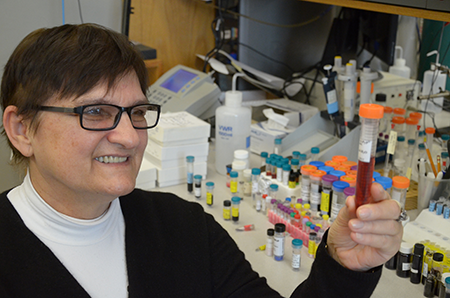
Ines Batinic-Haberle, PhD, professor emeritus of radiation oncology at Duke University School of Medicine, created hundreds of compounds before she hit upon the right one.
More than 30 years later, her drug, BMX-001, has improved survival and lessened cognitive decline for people with advanced brain cancer enrolled in a phase 2 clinical trial. The drug is also under study in clinical trials for several other cancers.
BMX-001 mimics the action of an enzyme naturally made by the body called superoxide dismutase, which was discovered in the 1960s by Irwin Fridovich, PhD, a Duke biochemist who was internationally renowned as “the father of free radical biology.”
Free radicals are unstable forms of oxygen that can damage cells. Fridovich discovered that superoxide dismutase neutralizes free radicals and thus is “the enzyme that we can’t live without,” Batinic-Haberle said.

Batinic-Haberle began designing a synthetic form of the enzyme in the 1990s, while working as a postdoctoral associate in Fridovich’s lab. She wanted to create a small molecule that, unlike superoxide dismutase, is “very stable, water soluble, and positively charged, therefore able to cross cellular membranes and reach the brain,” she said.
Katherine B. Peters, MD, PhD, professor of neurosurgery and neurology at the Preston Robert Tisch Brain Tumor Center at Duke, led the multi-institutional trial of BMX-001 in people with high grade glioma (brain cancer) and presented the results at the Society for Neuro-oncology Annual Meeting in November 2023, as the plenary presentation.
The trial included 160 patients with high-grade glioma at nine clinical centers. People who took BMX-001 combined with radiation and standard-of-care chemotherapy (temozolomide) had an increase in median survival time of 6.6 months compared to those who received radiation and chemotherapy alone.

1968: Irwin Fridovich and graduate student Joe McCord open up a whole new field of biomedical science with their discovery of superoxide dismutase.
BMX-001 also helped reduce cognitive decline induced by radiation. People who received it with radiation therapy performed better on cognitive tests than those who received radiation therapy alone. In addition, advanced imaging showed that normal brain matter was protected, Peters said.
The cognitive effects that come from a brain tumor are what many patients fear the most, Peters said. Depending on the location of the tumor, many people can experience difficulties with language or with focusing and multitasking. "Our patients have to contend with both a cancer diagnosis and a neurologic diagnosis all in one," she said.
In addition, radiation treatment can worsen cognitive challenges. Anywhere from 50% to 90% of patients who receive brain radiation will experience cognitive dysfunction as a side effect. "This really is an unmet need for our patients,” Peters said. “We are getting better at treating our patients, and now we need to maintain their quality of life as best we can.”

The trial was sponsored by BioMimetix, LLC, a company founded by Batinic-Haberle and collaborators, which licensed the drug after it was patented at Duke.
BioMimetix co-founder Ivan Spasojevic, PhD, associate professor in medicine and director of Duke Cancer Institute’s Pharmacokinetics and Pharmacodynamics Shared Resource Core, has collaborated with Batinic-Haberle on BMX-001 since its beginnings. He established how BMX-001 interacts with biological molecules, played a critical role in the design of dosing for preclinical and clinical studies, and documented that the drug reaches tissues in the brain and the heart, Batinic-Haberle said.
The first human clinical study of BMX-001 in glioma began in 2016. The drug is currently being tested in clinical trials for possible use in treating multiple brain metastases, anal cancer, rectal cancer, and head and neck cancer. Three of those trials are ongoing at Duke, while others are based across the United States.
Batinic-Haberle and Spasojevic are working with Angeles Alvarez Secord, MD, professor of obstetrics and gynecology, on animal studies to assess the drug’s ability to protect against side effects of ovarian cancer treatment. Early data suggest the drug suppresses tumor growth while reducing peripheral neuropathy, Batinic-Haberle said.
In recognition of her groundbreaking work on BMX-001, in 2021 Batinic-Haberle received the Discovery Award from the Society for Redox Biology and Medicine.